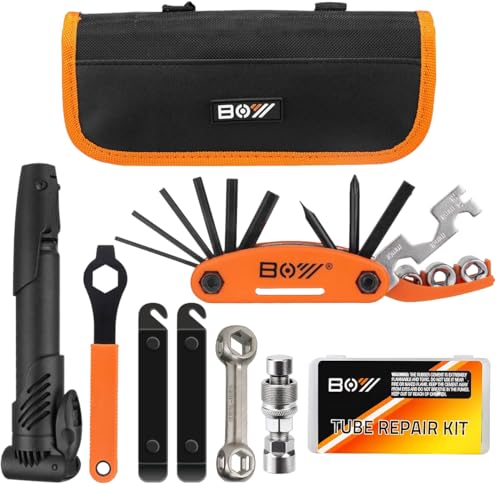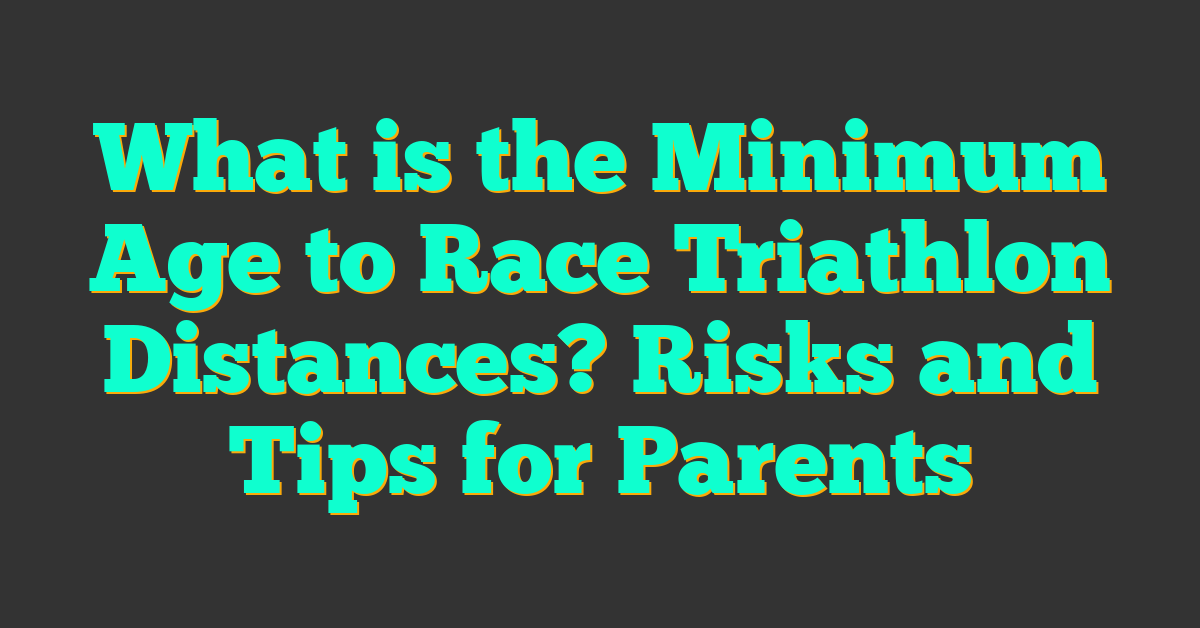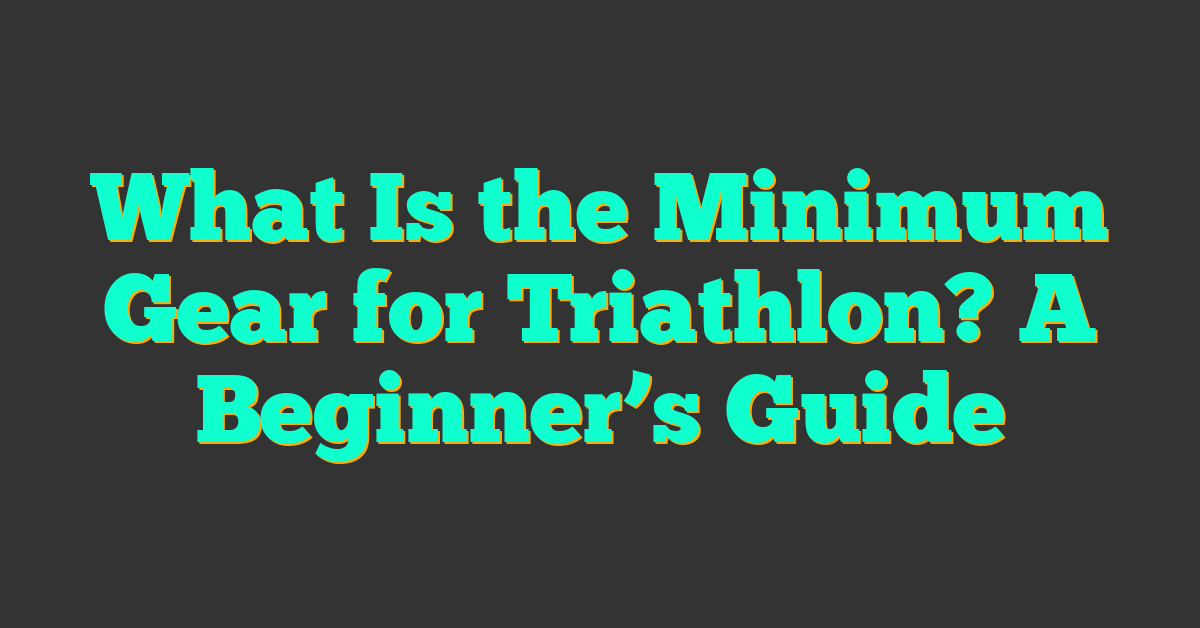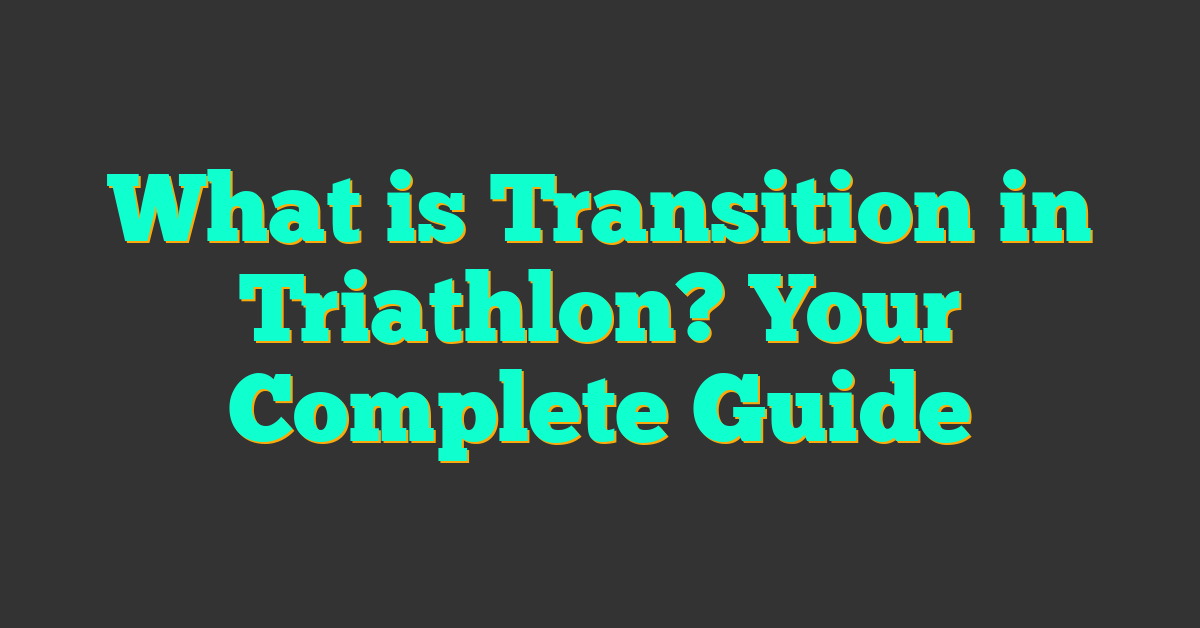If you’re new to triathlons, you may be wondering what to eat before a race to ensure you have enough energy to make it through the swim, bike, and run. Proper nutrition is key to performing your best and preventing fatigue and cramps during the race. In this article, we’ll cover some tips and tricks for what to eat before a triathlon so you can feel confident and energized on race day.

Understanding triathlon nutrition is an important first step in planning your pre-race meals. Your body needs a balance of carbohydrates, protein, and healthy fats to perform at its best. Carbohydrates are especially important as they provide energy for your muscles. Protein helps to repair and build muscle tissue, while healthy fats provide sustained energy and aid in nutrient absorption.
Pre-training meal planning is also crucial to ensure you have enough energy for your workouts. You should aim to eat a meal that is high in carbohydrates about 3-4 hours before training. This will give your body enough time to digest the food and convert it to energy. Hydration is also important, so be sure to drink plenty of water before and during your workouts.
Key Takeaways
- Understanding triathlon nutrition is key to performing your best on race day.
- Pre-training meal planning and hydration are crucial to ensure you have enough energy for your workouts.
- A balanced diet of carbohydrates, protein, and healthy fats will help you feel confident and energized on race day.
Understanding Triathlon Nutrition
Triathlon is a demanding sport that requires a lot of energy and stamina. To perform at your best, you need to fuel your body with the right nutrients. Proper nutrition is essential for triathletes to achieve optimal performance. In this section, we will discuss the basics of triathlon nutrition.
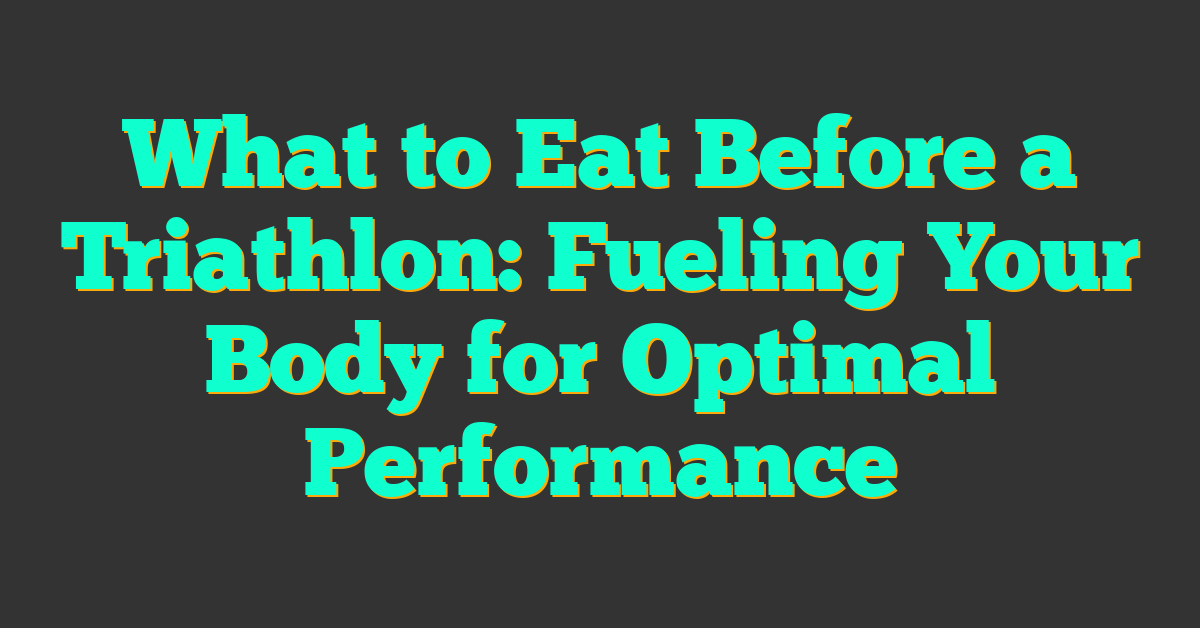
Macronutrients
Macronutrients are the three main components of food that provide energy to the body. They are carbohydrates, fats, and proteins. Carbohydrates are the primary source of energy for endurance athletes like triathletes. They provide quick energy and are stored in the muscles and liver as glycogen. Fats are also an important energy source, especially during longer endurance events. Proteins are necessary for muscle repair and recovery after exercise.
Micronutrients
Micronutrients are essential vitamins and minerals that the body needs in small amounts. They are involved in many processes in the body, including energy production, muscle function, and immune system function. Some important micronutrients for triathletes include iron, calcium, and vitamin D.
Sports Nutrition
Sports nutrition is a specialized field that focuses on the unique nutritional needs of athletes. It involves the use of supplements, such as energy gels and sports drinks, to enhance performance. Sports nutrition also involves timing meals and snacks to optimize energy levels during training and competition.
Triathlon Nutrition Plan
A triathlon nutrition plan is a customized plan that outlines the specific nutritional needs of a triathlete. It includes recommendations for daily calorie intake, macronutrient ratios, and timing of meals and snacks. A triathlon nutrition plan should be developed in consultation with a sports dietitian or nutritionist to ensure that it meets the athlete’s specific needs.
In summary, understanding triathlon nutrition is essential for optimal performance. Triathletes need to fuel their bodies with the right nutrients, including carbohydrates, fats, proteins, and micronutrients. Sports nutrition and a customized triathlon nutrition plan can help athletes achieve their goals and perform at their best.
Pre-Training Meal Planning
Preparing for a triathlon requires a lot of effort and a well-planned diet. Your pre-training meal plan should include a balance of carbohydrates, protein, and healthy fats. Carbohydrates are essential as they provide energy for your workout. You should aim for 45-65% of calories from a meal, and for energy before a workout, have simple carbohydrates like bananas.
Protein sources are also important for muscle repair and recovery. You should aim for 15-20% of calories from protein. Good sources of protein include lean meats, fish, eggs, and dairy products. If you’re a vegetarian or vegan, you can get protein from sources such as beans, lentils, tofu, and nuts.
Healthy fats are also important for overall health and should make up 20-35% of your daily calorie intake. Good sources of healthy fats include avocados, nuts, seeds, and olive oil.
It’s important to plan your meals ahead of time to ensure that you’re getting the right balance of nutrients. You should also consider carb-loading before a big training day or race. Carb-loading involves increasing your carbohydrate intake a few days before your event to maximize your glycogen stores. This can help improve your endurance and delay fatigue during your workout.
Here is an example of a pre-training meal plan:
| Meal | Example |
|---|---|
| Breakfast | Greek yogurt with berries and granola |
| Snack | Apple slices with almond butter |
| Lunch | Grilled chicken with quinoa and roasted vegetables |
| Snack | Carrots and hummus |
| Dinner | Grilled salmon with sweet potato and green beans |
| Snack | Banana with peanut butter |
Remember, everyone’s nutritional needs are different, so it’s important to consult with a registered dietitian or sports nutritionist to develop a personalized meal plan that meets your individual needs.
Hydration and Electrolytes
Hydration is key when it comes to performing your best during a triathlon. You should start hydrating well before the race, and continue to drink fluids throughout the event. Water is always a great choice, but sports drinks can also be helpful. Sports drinks contain electrolytes that can help replace the minerals lost through sweat.
Electrolytes are important for maintaining proper hydration levels in your body. They help regulate the balance of fluids in your body and help your muscles function properly. You can get electrolytes from a variety of sources, including electrolyte drinks and energy drinks.
During a triathlon, it’s important to have a plan for staying hydrated. Many athletes choose to carry a bottle with them during the race, filled with either water or an electrolyte drink. You can also take advantage of the aid stations along the course, which typically offer water and sports drinks.
It’s important to note that everyone’s hydration needs are different, so it’s important to experiment during training to find what works best for you. Make sure to drink enough fluids before the race so that you start the event well hydrated. During the race, aim to drink fluids at regular intervals, and pay attention to your body’s signals to determine if you need more or less fluids.
In summary, staying hydrated and maintaining proper electrolyte balance is crucial for performing your best during a triathlon. Make sure to experiment with different fluids and electrolyte sources during training, and have a plan for staying hydrated during the race.
Race Day Breakfast
Your race day breakfast is an important part of your triathlon preparation. You want to make sure you have enough energy to power you through the race, but not so much that you feel weighed down or bloated.
One option for a race day breakfast is toast with peanut butter. This provides a good balance of carbohydrates and protein, which will give you sustained energy throughout the race. If you prefer something warm, oatmeal is a great choice. Add some fruit, such as a banana, for extra energy and flavor.
Fruit juice is a good way to hydrate and get some quick energy before the race. Just make sure it is 100% juice and not a sugary drink. Coffee is also a popular choice, as it can help increase endurance and alertness. However, be careful not to drink too much as it can cause dehydration.
« What is the Order of Events in a Triathlon?
Best Hydration System for Triathlon Bikes: Stay Hydrated During Your Race »
It’s important to experiment with different breakfast options during your training to see what works best for you. You don’t want to try something new on race day and have it upset your stomach. Stick to what you know works for you and make sure to eat your breakfast at least 2-3 hours before the race to give your body time to digest.
Consider creating a checklist of all the items you need for your race day breakfast, so you don’t forget anything important. This will help you stay organized and reduce stress on race day.
Carbohydrate Loading
Carbohydrate loading, also known as carb-loading, is a dietary strategy used by athletes to increase the amount of glycogen stored in their muscles before a race. This technique is particularly useful for endurance sports like triathlons, where the body needs a lot of energy to perform at its best.
To carb-load effectively, you should increase your carbohydrate intake in the days leading up to the race. A common approach is to consume 7-10 grams of carbohydrates per kilogram of body weight per day for 2-3 days before the event. For example, if you weigh 70 kg, you should aim to consume between 490 and 700 grams of carbohydrates per day.
When it comes to carb-loading, not all carbohydrates are created equal. While pasta is a popular choice, you can also consume carbohydrate-rich snacks, white rice, and other high-carb foods. It’s important to choose foods that are easy to digest and won’t upset your stomach. Experiment with different foods during your training to see what works best for you.
During the carb-loading phase, it’s also important to stay hydrated and avoid foods that are high in fat and fiber. These can slow down digestion and make you feel sluggish. Instead, focus on simple carbohydrates that are easy to digest and will give you a quick burst of energy.
In conclusion, carb-loading can be an effective way to boost your performance in a triathlon. By increasing your carbohydrate intake in the days leading up to the race, you can help your body store more glycogen and have more energy to fuel your performance. Experiment with different foods and find what works best for you.
Protein and Fat Intake

In addition to carbohydrates, protein and fat are also essential macronutrients that should be included in your pre-triathlon meal plan. Protein is important for muscle repair and recovery, while fat provides long-lasting energy and helps keep you feeling full.
When it comes to protein, aim for 1.4-1.6 grams of protein per kilogram of body weight per day. For a 160-pound athlete, this translates to roughly 100-115 grams of protein per day. Good sources of protein include chicken breast, fish, eggs, and plant-based options like beans, lentils, and tofu.
While it’s important to include protein in your pre-triathlon meal, don’t overdo it. Too much protein can be difficult to digest and may leave you feeling sluggish during the race. Instead, aim for a moderate amount of protein, such as a small serving of chicken breast or a scoop of protein powder mixed with almond milk.
In addition to protein, healthy fats are also an important part of your pre-triathlon meal plan. Healthy fats, such as those found in nut butter and avocado, provide sustained energy and help keep you feeling full throughout the race.
When choosing fats, opt for healthy sources like nuts, seeds, and avocado, and avoid saturated and trans fats found in processed foods. A tablespoon of nut butter on whole grain toast or a small serving of avocado with eggs are great options for incorporating healthy fats into your pre-race meal.
Overall, incorporating a moderate amount of protein and healthy fats into your pre-triathlon meal plan can help provide sustained energy and keep you feeling full throughout the race.
Snacks and Energy Boosters

When it comes to snacking before a triathlon, it’s important to choose foods that are easy to digest, provide sustained energy, and won’t cause any stomach discomfort. Here are some great options to consider:
Bananas: Bananas are a great source of carbohydrates, potassium, and vitamin C. They are easy to digest and can provide a quick energy boost before your race.
Energy Bars: Energy bars are a convenient and portable option for a pre-race snack. Look for bars that are high in carbohydrates and low in fiber to avoid any digestive issues. Some popular options include Clif Bars and KIND Bars.
Honey: Honey is a natural source of carbohydrates and can provide a quick energy boost. It’s also easy to digest and won’t cause any stomach discomfort. Try adding a spoonful of honey to your pre-race snack or drink.
If you prefer something more substantial, consider an energy gel or chew. These products are specifically designed to provide a quick energy boost during exercise. Just be sure to test them out during your training to make sure they work well for you.
Remember, the key is to choose snacks and energy boosters that work for you and won’t cause any digestive issues. Stick with foods that you know your body can handle and that provide sustained energy throughout your race.
The Night Before the Race
The night before a triathlon is crucial to ensure that you have enough energy to complete the race. You want to eat a meal that is easy to digest and provides you with enough carbohydrates to fuel your body. It’s important to stay away from foods that are high in fat, fiber, and protein, as they take longer to digest and can cause discomfort during the race.
One option for a pre-race dinner is spaghetti with a tomato-based sauce. This meal is easy to digest, provides you with a good source of carbohydrates, and is low in fat. You can also add some vegetables to the sauce, such as bell peppers and mushrooms, to increase the nutrient content of the meal.
Another option is to have a baked potato with a small amount of butter or sour cream. Potatoes are a great source of carbohydrates and are easy to digest. You can also add some steamed vegetables, such as broccoli or carrots, to increase the nutrient content of the meal.
It’s important to get a good night’s sleep before a race. Make sure you go to bed early enough to get at least 7-8 hours of sleep. This will help your body recover and prepare for the race.
Liver glycogen is an important source of energy during endurance exercise. To make sure your liver glycogen stores are topped off, you can have a small snack before bed. A good option is a banana with a tablespoon of peanut butter. Bananas are a good source of carbohydrates, and the peanut butter provides a small amount of protein and fat to help slow down the digestion of the carbohydrates.
Overall, the night before a triathlon is a time to focus on getting enough carbohydrates to fuel your body and getting a good night’s sleep. Stick to foods that are easy to digest and low in fat, fiber, and protein. Don’t forget to hydrate throughout the day and avoid alcohol, as it can interfere with your sleep and hydration levels.
During the Race

Congratulations, you’ve made it to the race! Now it’s time to fuel your body to keep it going strong throughout the triathlon. During the race, it’s important to continue to hydrate and refuel your body with carbohydrates and electrolytes.
Most triathlons have aid stations along the course where you can grab water, sports drinks, and snacks. Take advantage of these stations and drink plenty of fluids to avoid dehydration. You can also bring your own hydration pack or bottle to ensure that you have enough fluids throughout the race.
When it comes to fueling during the race, it’s important to consume easily digestible carbohydrates. Energy gels, chews, and bars are great options to keep your body fueled during the run, swim, and bike portions of the race. Be sure to read the nutrition labels and choose products that contain a mix of carbohydrates and electrolytes to keep your energy levels up.
If you’re using the Outside+ app, you can set reminders to take your fuel at regular intervals throughout the race. This will help you stay on top of your nutrition and avoid hitting the wall.
In summary, during the race, make sure to hydrate and refuel with easily digestible carbohydrates and electrolytes. Take advantage of aid stations and bring your own hydration pack or bottle if necessary. Use the Outside+ app to set reminders to take your fuel at regular intervals and keep your energy levels up.
Post-Race Recovery
Congratulations on completing your triathlon! Now that you’ve crossed the finish line, it’s time to focus on recovery. Proper recovery is essential for reducing muscle soreness, preventing injury, and preparing for your next race. Here are some tips on what to eat after your triathlon:
Hydration
Rehydrating after your race is crucial. You’ve lost a lot of fluids during the race, so it’s important to replenish them. Drink plenty of water, coconut water, or a sports drink to replace lost fluids and electrolytes. Aim to drink at least 16-20 ounces of fluids for every pound of body weight lost during the race.
Protein
Eating protein after a race can help repair and rebuild your muscles. Aim for a protein-carbohydrate ratio of 1:3 or 1:4. Good sources of protein include chicken, fish, lean beef, eggs, and tofu. If you’re a vegetarian or vegan, you can get protein from sources like beans, lentils, nuts, and seeds.
Carbs
Carbohydrates are essential for replenishing your glycogen stores, which are depleted during the race. Aim for a carbohydrate-protein ratio of 3:1 or 4:1. Good sources of carbohydrates include fruits, vegetables, whole grains, and sports drinks.
Sleep
Getting enough sleep after your race is crucial for recovery. Your body repairs and rebuilds muscle tissue during sleep. Aim for 7-9 hours of sleep per night. If you have trouble sleeping, try to establish a relaxing bedtime routine and avoid caffeine and alcohol before bed.
Stretching
Stretching after your race can help reduce muscle soreness and improve flexibility. Focus on stretching your major muscle groups, such as your legs, back, and shoulders. Hold each stretch for 15-30 seconds and repeat each stretch 2-3 times.
By following these tips, you can help your body recover faster and be ready for your next race. Remember to listen to your body and give yourself time to recover.
Frequently Asked Questions
What are some good pre-race dinner options for a triathlon?
Your pre-race dinner should be high in carbohydrates, moderate in protein, and low in fat and fiber. Some good options include pasta with tomato sauce, rice with grilled chicken and vegetables, or a baked potato with a small amount of butter.
What are some snacks that are good for a triathlon?
Snacks should be easy to digest and provide a quick source of energy. Good options include bananas, energy bars, fruit smoothies, or sports drinks. Avoid snacks that are high in fat, fiber, or protein, as they can be difficult to digest during exercise.
How should I fuel during a triathlon?
During a triathlon, it’s important to consume carbohydrates to maintain your energy levels. Good options include sports drinks, energy gels, and energy bars. Make sure to stay hydrated by drinking water or sports drinks throughout the race.
What are some foods to avoid before an Ironman?
Before an Ironman, it’s important to avoid foods that can cause digestive issues or discomfort during the race. Some foods to avoid include high-fiber foods, spicy foods, and fatty or greasy foods. It’s also best to avoid alcohol and caffeine before the race.
What is the best way to prepare nutritionally for a triathlon?
To prepare nutritionally for a triathlon, it’s important to eat a balanced diet that includes plenty of carbohydrates, protein, and healthy fats. Make sure to hydrate well in the days leading up to the race, and eat a carbohydrate-rich meal a few hours before the race.
What is the recommended triathlon diet plan?
A recommended triathlon diet plan should consist of 55-65% carbohydrates, 15-20% protein, and 20-25% fat. Make sure to eat a variety of fruits, vegetables, whole grains, lean protein, and healthy fats. It’s also important to stay hydrated by drinking plenty of water and electrolyte-rich sports drinks.




